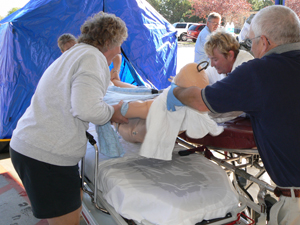 |
Health care workers in Imperial, Neb., learn the proper techniques for decontaminating a patient during a chemical spill crisis scenario. |
HEROES is funded through the UNMC College of Nursing by a University of Nebraska Programs of Excellence small project grant. Carol Pullen, Ed.D., a professor in the UNMC College of Nursing, leads the grant, which also includes Web-based learning materials. The grant focuses on interdisciplinary response to emergencies. The grant collaboration originated in the UNMC College of Nursing and the School of Allied Health Professions, and it has expanded to include organizations throughout the state of Nebraska.
The first stop on this early October journey took HEROES to Chase County Community Hospital in Imperial, Neb. Brian Carman leads the decontamination team at Chase and worked with the HEROES team to develop a scenario to meet their needs. The main focus of the exercise was to test their incident command and communication structures in a small scale event with less than five victims from arrival at the hospital to patient care delivery.
“Participants were engaged in all aspects of the drill and all hospital departments were represented,” said Beth Beam, HEROES project coordinator. “Overall, the drill went very smoothly and pointed out some changes that would improve their facility’s future decontamination team activations.”
The HEROES mobile unit then headed to Scottsbluff for two more days of interactive learning with students at the Western Nebraska Division of the UNMC College of Nursing and hospital staff at Regional West Medical Center.
In Scottsbluff, the students were drilled on how to handle a mock code in a simulated ambulance setting. Students were shown the activation movie and discussed the complexities of using devices such as the isopod for transport.
Finally, the students engaged in developing emergency care vignettes. The students created a disaster scenario and a vulnerable population victim. The disaster vignettes were filmed for further sharing and discussion on Blackboard, a software system that allows universities to post classroom materials online.
The last day of the trip was spent sharing biological and chemical preparedness processes with key hospital staff at Regional West Medical Center in Scottsbluff. Patricia Broderick and Marsha Meyer worked with the HEROES team to develop the course content and event plans.
Two, three-hour sessions were provided that included information on the Strategic National Stockpile of vaccines for health care workers, Duodote Autoinjectors (nerve agent antidote), and isolation techniques for potentially infectious patients.
The presentation was an active dialogue that included sharing about different Nebraska resources, policies and procedures, and unique challenges to their facility.
The mobile simulation unit (housed in a 16 foot by 8 foot mobile trailer) contains training equipment, including high fidelity mannequins used to teach about response to biological and chemical incidents. It is a flexible space both for transportation and educational simulation use.
Along with the mobile unit, participants can access the HEROES Web site, which features a variety of interactive videos and simulation drills to prepare students, health professionals and others who might respond to bioterrorism and public health emergencies.
The Web site is tailored to the health care community, but anyone, including first-responders, is welcome to use it. It contains short videos and games, as well as other resources. The site’s resources section contains a wealth of information from a variety of sources, including isolation and quarantine, hazardous materials, information on chemical exposure, emergency preparedness, nuclear and radiological terrorism, and response to mass casualties.
The services provided by the HEROES team are free, with travel and lodging the only cost to the participating health care organization or educational institution. For more information, check out the Web site or contact Beth Beam at 402-559-6547.